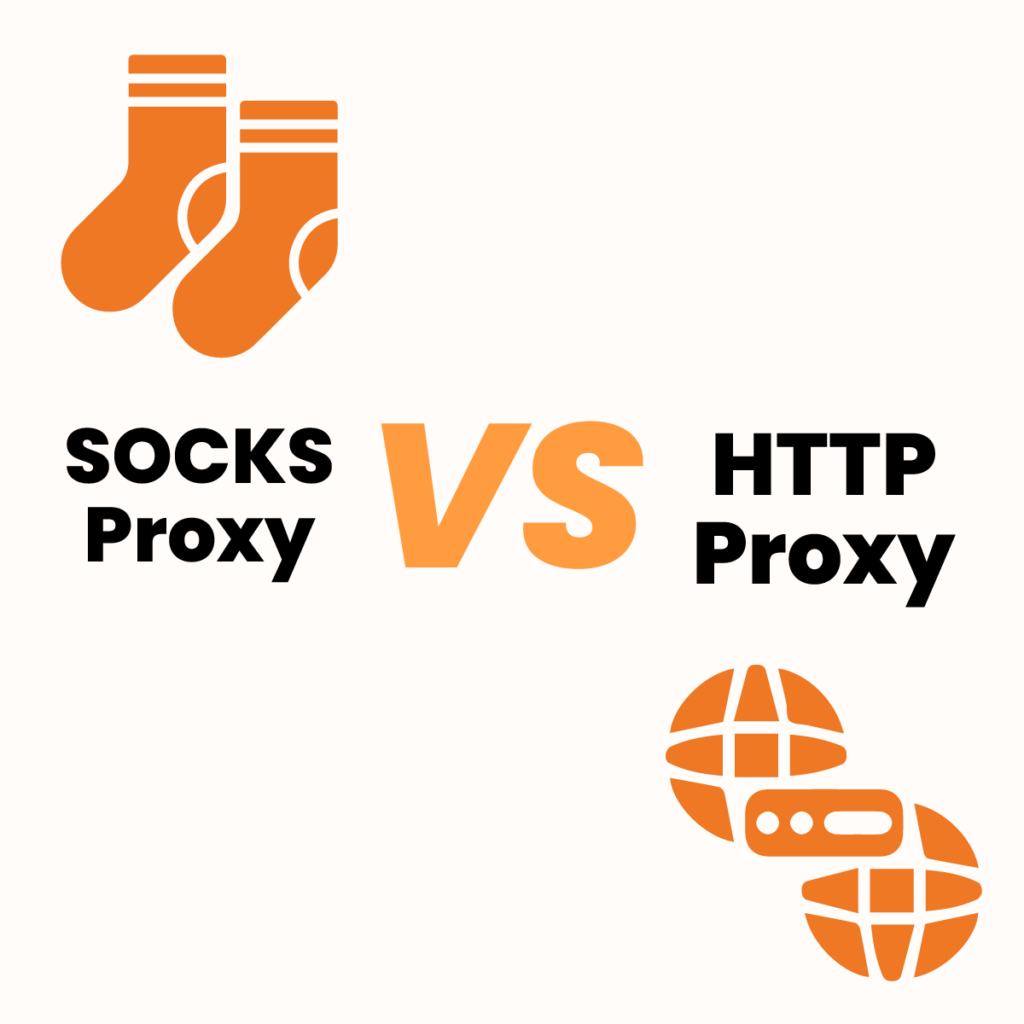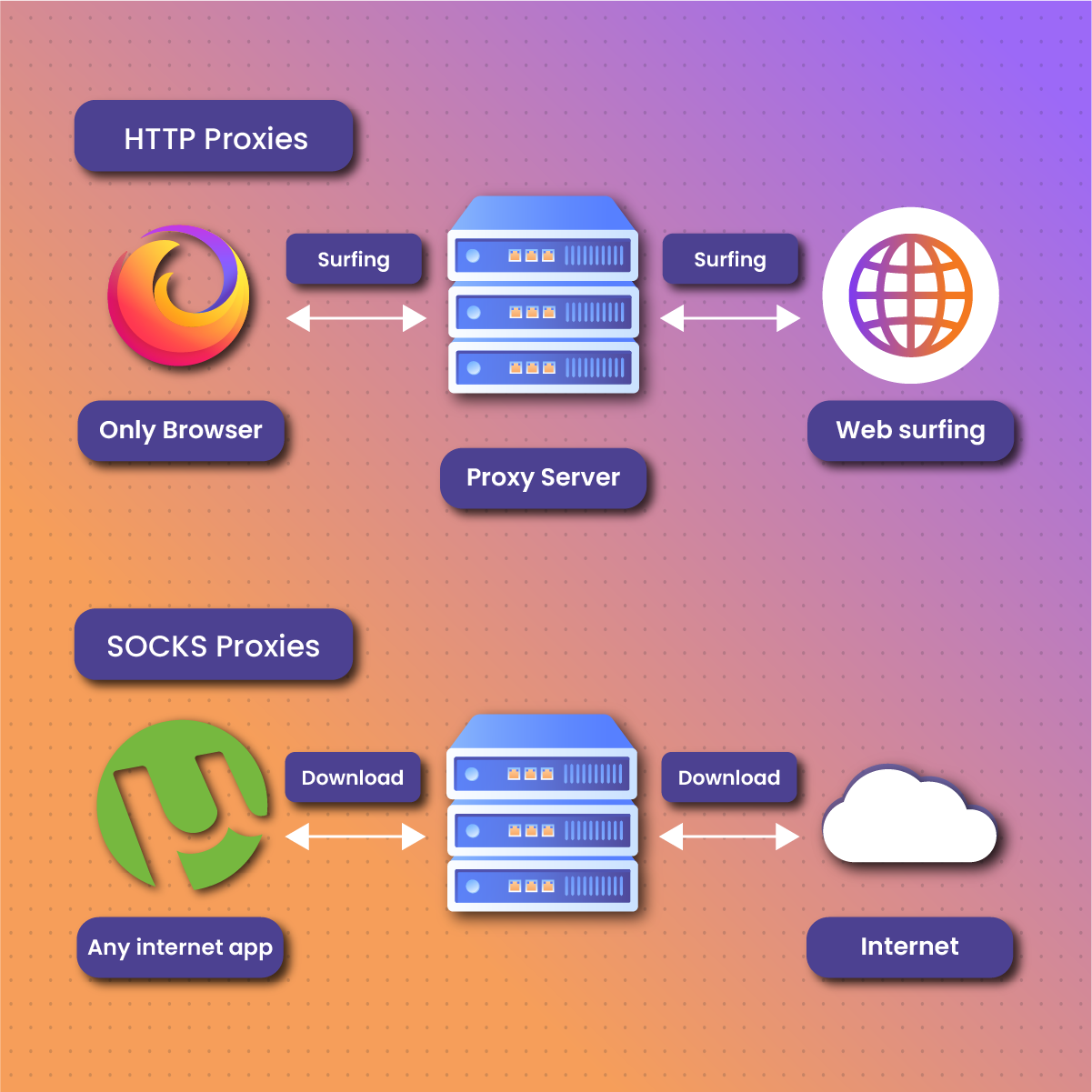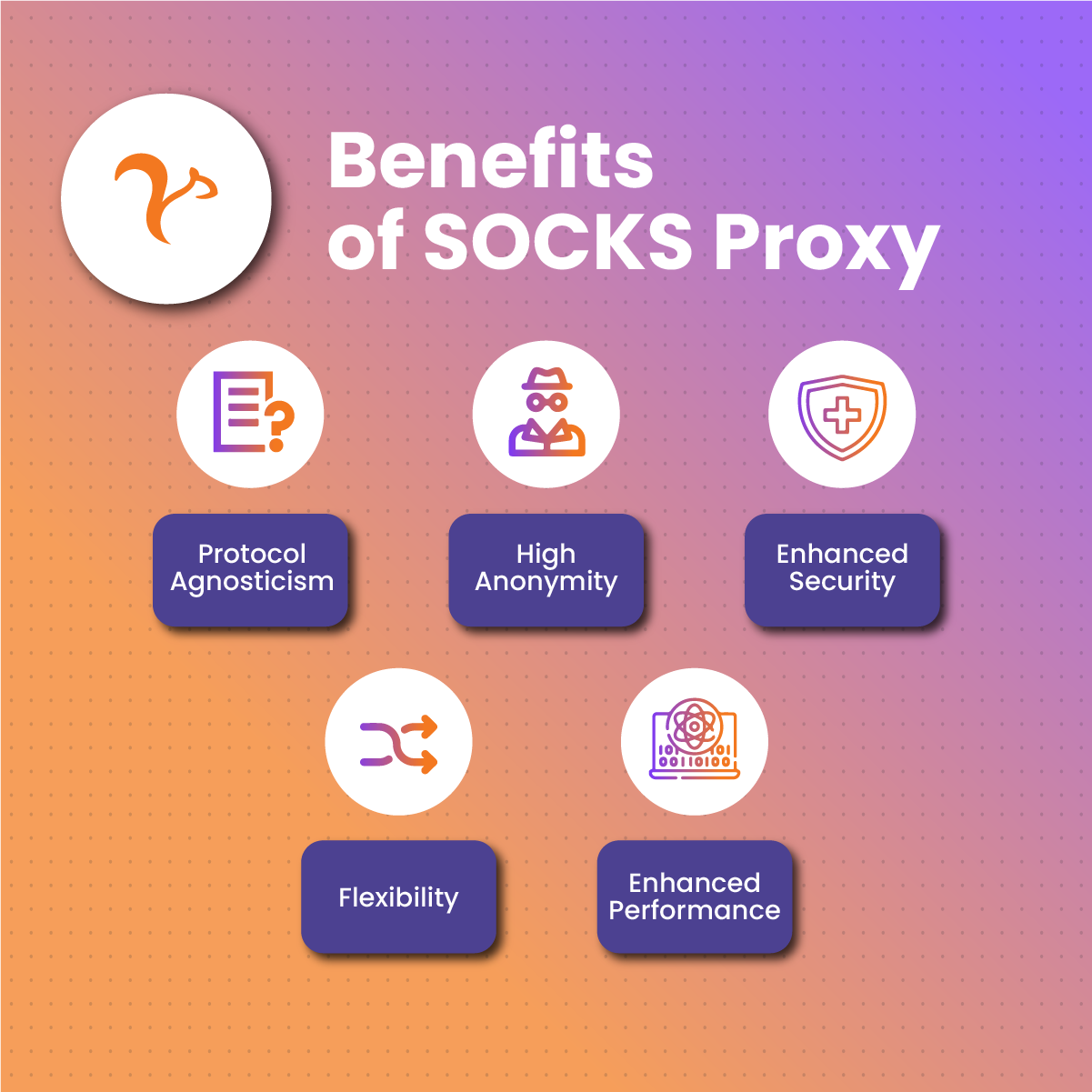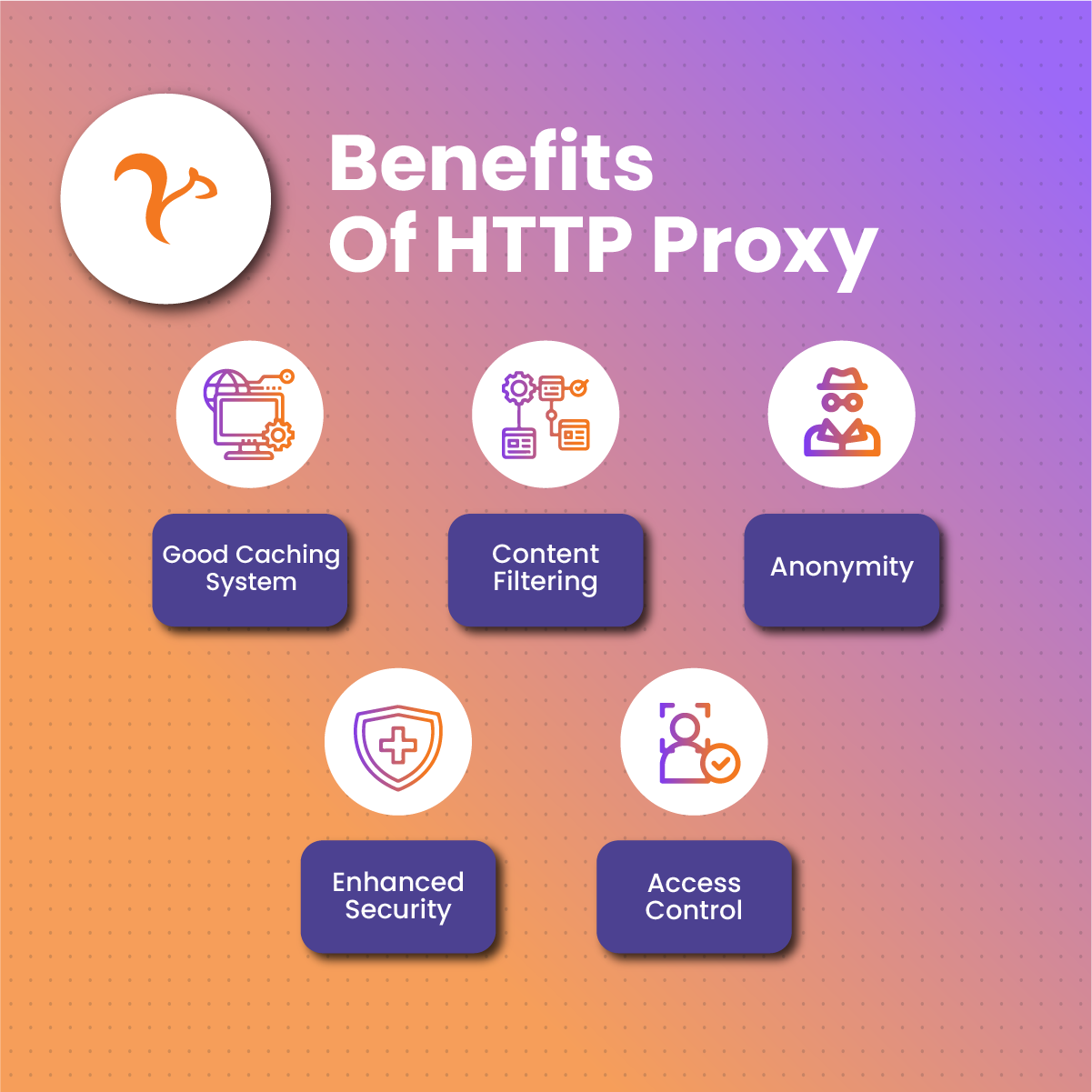Choosing between the SOCKS proxy vs HTTP proxy might be difficult when handling your web scraping task, especially when you don’t know their differences.
Today, we will delve into the significant differences between the SOCKS proxy vs HTTP proxy, including their definitions, types, benefits, and more. Stay put. This journey will equip you with all the knowledge needed to make a perfect choice between the SOCKS proxy vs HTTP proxy based on your preference. Let’s get started!
SOCKS Proxy Vs HTTP Proxy: Brief Overview 
Proxies are intermediary servers that act as a gateway between a user’s device and the internet. Examples include ISP proxies, Residential proxies, static residential proxies, etc. Proxies work on a set of rules called proxy protocols. This governs the communication between a client device and a proxy server. These protocols define how data is transmitted, authenticated, and routed through the proxy server. For example, when a user requests information or resources from the internet, their request is first routed through the proxy server. This is according to the proxy protocol, which then forwards the request to the destination server on behalf of the user.
Similarly, when the destination server responds, the proxy server receives the response and delivers it to the user. The proxy protocol facilitates the process. Furthermore, SOCKS (Socket Secure) and HTTP (Hypertext Transfer Protocol) are two standard proxy protocols used in processes, as seen in the SOCKS proxy vs HTTP proxy example above. They have their characteristics, advantages, and use cases. Continuing our discussion on SOCKS proxy vs HTTP proxy, let’s look into the definition of SOCKS proxy.
SOCKS Proxy Vs HTTP Proxy: What Is A SOCKS Proxy?
In this SOCKS proxy vs HTTP proxy article, a SOCKS proxy (Socket Secure) is a proxy server that operates at a lower level than HTTP proxies. It primarily focuses on routing network packets between a client and a server. Also, between the SOCKS proxy vs HTTP proxy, SOCKS proxies can handle various types of traffic, including Transmission Control Protocol (TCP), User Datagram Protocol (UDP), and Internet Control Message Protocol (ICMP). This protocol agnosticism makes it versatile and suitable for applications that require support for different network protocols. Additionally between the SOCKS proxy vs HTTP proxy, SOCKS proxy provides high anonymity and security because they do not inspect or modify the traffic. Lastly, they can hide the user’s IP address and location from the destination server.
SOCKS Proxy Vs HTTP Proxy: Types Of SOCKS Proxy
In this SOCKS proxy vs HTTP proxy article, we learned that there are two main SOCKS proxy types: SOCKS4 and SOCKS5. But we will also look into the SOCKS4a to gain more profound knowledge. Here are the explanations below.
SOCKS4 Proxy
SOCKS4 is one of the earlier versions of the SOCKS protocol. It supports TCP connections but does not have built-in support for handling UDP traffic. One of the limitations of SOCKS4 is that it does not support DNS resolution. Clients must resolve domain names locally before sending requests to the proxy server. However, SOCKS4 proxies offer fast performance and are suitable for applications primarily relying on Transmission Control Protocol (TCP) connections, such as web browsing and File Transfer Protocol (FTP).
SOCKS4a Proxy
SOCKS4a is an extension of the SOCKS4 protocol that addresses the limitation of DNS resolution. Unlike SOCKS4, which requires clients to resolve domain names locally, SOCKS4a allows clients to specify the destination domain name during the connection setup phase. This feature enables remote DNS resolution through the proxy server. This makes the SOCKS4a proxies suitable for applications that require DNS resolution through the proxy, such as anonymizing traffic or accessing geo-restricted content.
SOCKS5 Proxy
SOCKS5 is the latest and most versatile version of the SOCKS protocol. It supports both TCP and UDP connections. This makes it suitable for various applications, including web browsing, email, instant messaging, and P2P file sharing. SOCKS5 proxies also offer additional features such as authentication, allowing for secure access control and support for IPv6. These features provide compatibility with the latest internet protocols. Additionally, SOCKS5 proxies can handle DNS resolution, enhancing flexibility and usability.
SOCKS Proxy Vs HTTP Proxy: Benefits of SOCKS Proxy
In this section of our guide on SOCKS proxy vs HTTP proxy, let’s explore the benefits of SOCKS proxies below:
It Has Protocol Agnosticism
As one difference between the SOCKS proxy vs HTTP proxy, SOCKS proxies are not limited to handling HTTP traffic like HTTP proxies. They can take various protocols, including TCP, UDP, and ICMP. This makes them versatile for a wide range of applications.
It Provides High Anonymity
As already hinted in this SOCKS proxy vs HTTP proxy article, SOCKS proxies provide high anonymity by hiding the user’s IP address and location from the destination server. This enhanced privacy makes SOCKS proxies ideal for activities where anonymity is desired, such as torrenting or accessing geo-restricted content.
It Provides Enhanced Security
SOCKS proxies that do not inspect or modify the traffic passing through them. This reduces the risk of data manipulation or interception. In this SOCKS proxy vs HTTP proxy article, SOCKS proxies support various authentication methods, allowing them to secure access control and user authentication.
It Is Flexible
One of the differences between the SOCKS proxy vs HTTP proxy is that SOCKS proxies can be used in various scenarios, including bypassing network firewalls, accessing restricted websites, and anonymizing internet traffic. Their protocol agnosticism and support for different network protocols make them suitable for various applications.
It Offers Enhanced Performance
SOCKS proxies typically offer lower latency and better performance than HTTP proxies, especially for non-HTTP traffic. Since SOCKS operates at a lower level in the Open System Interconnection (OSI) model, it can efficiently handle diverse types of network traffic without the overhead associated with HTTP proxies.
SOCKS Proxy Vs HTTP Proxy: What is HTTP Proxy?
For more knowledge about the SOCKS proxy vs HTTP proxy, An HTTP proxy (Hypertext Transfer Protocol proxy) is a proxy server specifically designed to handle HTTP traffic. It is commonly used for caching web content, filtering traffic, and optimizing web browsing performance. They can improve performance by caching frequently accessed web pages, reducing bandwidth usage, and optimizing page load times. Additionally, in this SOCKS proxy vs HTTP proxy article, HTTP proxies may offer features such as content filtering, URL blocklisting, and malware detection to enhance security for web browsing.
SOCKS Proxy Vs HTTP Proxy: Benefits Of HTTP Proxy 
Here are the benefits of HTTP proxies for a better understanding of SOCKS proxy vs HTTP proxy.
It Provides A Good Caching System
In the debate between SOCKS proxy vs HTTP proxy, HTTP proxies can cache frequently accessed web content than SOCKS. This reduces bandwidth usage and improves browsing performance by serving cached content instead of retrieving it from the original server each time. This results in faster page load times and improved overall user browsing experience.
It Offers Content Filtering
HTTP proxies can filter and inspect incoming and outgoing web traffic. This allows organizations to enforce access control policies and block access to certain websites or content based on predefined rules. This can help improve productivity, enforce compliance with regulatory requirements, and protect against security threats.
It Provides Anonymity
While the SOCKS proxy might be better, as seen in this SOCKS proxy vs HTTP proxy, HTTP proxies can provide anonymity by hiding the user’s IP address from the destination server. This can help protect user privacy and prevent websites from tracking users’ online activities.
It Provides Enhanced Security
HTTP proxies can enhance security by inspecting incoming and outgoing web traffic for malicious content, viruses, and other cyber threats. They can also provide URL blocklisting, and malware detection to protect users and organizations from online threats.
Access Control
HTTP proxies can enforce access control policies by restricting access to specific websites or content based on user credentials, IP addresses, or other parameters. With these benefits, this SOCKS proxy vs HTTP proxy can help organizations control and manage internet usage, prevent unauthorized access to sensitive information, and enforce compliance with corporate policies.
SOCKS Proxy Vs HTTP Proxy: Major Differences
You must know the significant differences between the SOCKS proxy vs HTTP proxy.
| Key Features | SOCKS | HTTP |
| Protocol Support | SOCKS proxies support protocols beyond HTTP, including TCP, UDP, and ICMP. This protocol agnosticism makes SOCKS proxies more versatile and suitable for applications that require diverse network protocols. | HTTP proxies are designed specifically for handling HTTP traffic. They intercept and forward HTTP requests and responses between clients and servers. This makes them ideal for web browsing and accessing web-based services. |
| Functionality | SOCKS operates at a lower level than HTTP. It primarily focuses on routing network packets between a client and a server. It can handle various types of traffic, such as email clients, instant messaging, and torrenting. | HTTP proxies are optimized for handling HTTP traffic. They are suitable for caching web content, filtering traffic, and optimizing web browsing performance. |
| Authentication | SOCKS proxies support various authentication methods, including username/password authentication and authentication based on IP address. | HTTP typically supports basic authentication methods, relying on username/password authentication or IP-based access control lists. They may lack the robust authentication mechanisms offered by SOCKS proxies. |
| Performance | SOCKS proxies generally provide lower latency and better performance than HTTP proxies. | While HTTP are optimized for web browsing performance, they may not perform as well as SOCKS proxies for non-HTTP traffic |
| Security | SOCKS proxies provide high anonymity and security, as they do not inspect or modify the traffic passing through them. | HTTP proxies offer features that can provide enhanced security for web browsing |
These differences in our discussion on SOCKS proxy vs HTTP proxy highlight the distinct functionalities and advantages of SOCKS proxy vs HTTP proxy.
SOCKS Proxy Vs HTTP Proxy: Frequently Asked Question
What Is The Primary Difference Between The SOCKS Proxy and HTTP Proxy?
The primary difference lies in their protocol support and functionality. SOCKS proxies are protocol agnostic and can handle various types of traffic, including Transmission Control Protocol (TCP), User Datagram Protocol ( UDP) , and Internet Control Message Protocol (ICMP). This makes them versatile for multiple applications. On the other hand, HTTP proxies are designed explicitly for handling HTTP traffic, which makes them ideal for web browsing and accessing web-based services.
Which Proxy Is Better For Anonymity: SOCKS or HTTP?
In the debate between SOCKS proxy vs HTTP proxy, SOCKS proxies typically provide a higher level of anonymity compared to HTTP proxies. This is because SOCKS proxies do not inspect or modify the traffic passing through them, making it harder for destination servers to identify the user’s IP address and location. However, SOCKS and HTTP proxies can offer varying degrees of anonymity depending on their configuration and usage.
Can I Use Socks And Http Proxies Together For Enhanced Functionality?
Yes, it is possible to use SOCKS and HTTP proxies together in a configuration known as “proxy chaining” or “proxy cascading.” In this setup, the traffic first passes through a SOCKS proxy before reaching an HTTP proxy or vice versa. This can provide enhanced functionality, such as combining the anonymity of SOCKS proxies with the performance optimization features of HTTP proxies. However, users should be aware that proxy chaining can introduce additional complexity and may impact performance depending on the configuration and network conditions.
SOCKS Proxy Vs HTTP Proxy: Conclusion
We’ve concluded our guide on SOCKS proxy vs HTTP proxy. Understanding the differences between the SOCKS proxy vs HTTP proxy is essential for choosing the right solution. While both proxies are intermediaries between users and the internet, they vary significantly regarding protocol support, functionality, performance, security, and anonymity.
At NetNut, we are passionate about what is best for your business and organizations, and this is why we have created several proxy web solutions for your needs. Whether your infrastructure requires a standard SOCK proxy protocol or an HTTP proxy approach, our hardworking team is ready to meet your needs. Some of the services we offer are residential proxies, mobile proxies, ISP, static and rotating proxies. You can enjoy full benefits when you subscribe to what suits your needs now.









